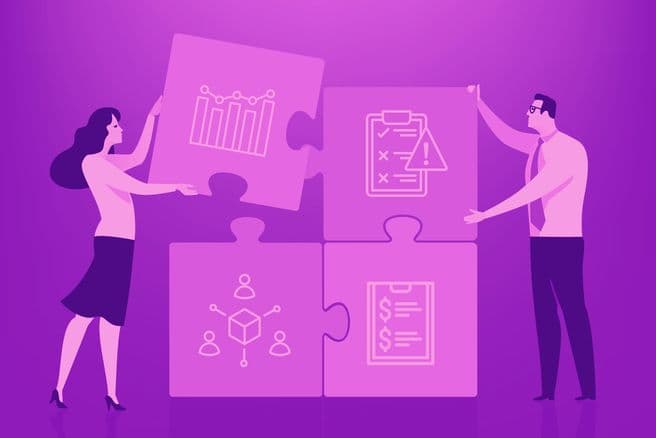Businesses run on contracts. These documents govern many aspects of daily business operations and impact profitability.
While most business leaders understand the importance of their contracts, not all of them know how much data is buried in contracts and how to leverage it to cut costs and increase revenue.
 The Significance of Leveraging Contract Data in Decision-Making
The Significance of Leveraging Contract Data in Decision-Making
Contract data includes all of the information in your contracts, including terms, conditions, obligations, clauses, dates, and every other data source. Leaders can use this data to make data-driven decisions and drive growth in areas from marketing to supplier negotiations.
Aggregating data from multiple contracts gives you insight into:
Financial planning for accurate cost analysis and forecasting expenses
Vendor and supplier performance evaluation so you can avoid overpaying
Key performance indicator (KPI) tracking to review contract fulfillment
Strategic planning in marketing and product development
Business process improvement and automation opportunities
Stronger negotiation leverage based on historical data and market conditions
Identifying and mitigating risks, such as global compliance issues
Although service level agreements and other types of contracts may seem straightforward and mainly the purview of legal teams, they contain data that provide actionable strategies. For example, you can uncover opportunities for money-saving automation by identifying labor-intensive, repetitive tasks. On the other hand, pricing trends can help determine if a new product idea will be cost-effective. If your contract analysis illustrates too many of your agreements have variable costs, you may experience unexpected expenses.
The fact that contract data management supports strategic planning makes it relevant to both legal and business teams. Contract analysis allows businesses to make accurate forecasts, negotiate better terms, and effectively manage supplier relationships.
4 Ways To Utilize Contract Data Strategically
Strategic contract management can help you improve almost all areas of business operations. But while you can analyze contracts manually, using a specialized contract analytics platform is much faster and more effective. These solutions use artificial intelligence and machine learning algorithms to extract and analyze data from multiple contracts in a central location. Here are four ways to use them to gain contract insights and improve business performance.
 1. Identify Trends and Patterns
1. Identify Trends and Patterns
One of the most efficient uses of contract reporting is identifying hidden trends and patterns. Artificial intelligence (AI) platforms can analyze your contracts to uncover correlations and issues you may not be aware of.
Understanding historical trends and patterns can drive future business strategies. When you see trends in pricing, discounts, and payment terms across contracts, you can use this information to negotiate better deals and more favorable terms that can lead to substantial cost savings.
Data analytics tools can identify contract terms, performance, and compliance patterns. You may notice frequent delays with a particular vendor or consistently favorable terms in contracts negotiated by specific teams. You can act on this information to switch vendors or standardize the practices of high-performing teams.
You can also use advanced analytics methods such as predictive modeling to forecast future trends based on historical data. If you can anticipate price fluctuations or identify seasonal demand spikes, you can plan accordingly to optimize your outcomes.
 2. Risk Assessment and Mitigation
2. Risk Assessment and Mitigation
Your contracts can expose you to compliance, performance, or other risks in several areas. One of the biggest risks any business faces is missing revenue opportunities. Some types of risks you can quantify and mitigate with a contract data management system include:
Compliance management: Contract analytics tools can alert you to any violations of regulatory requirements or industry standards so you can avoid legal penalties and damage to your reputation.
Vendor performance evaluation: Your contract data can help assess vendor reliability, delivery timelines, and service quality. Identifying underperforming vendors early can help you mitigate supply chain risks.
Financial exposure: Contract terms related to financial commitments, payment schedules, and pricing models affect how you manage cash flow so you can avoid unexpected financial burdens.
Contractual obligations: By alerting you to upcoming deadlines, your contract management software can help you meet your commitments and take early corrective action if needed.
Risk Scoring: You can use historical contract data to assign risk scores to contracts based on factors like complexity, financial impact, and past performance. You can then prioritize high-risk contracts for closer monitoring and more stringent management.
Predictive Risk Management: Predictive analytics can forecast potential risks based on historical trends and current data so you can anticipate and mitigate issues before they escalate.
 3. Optimize Supplier Relationships
3. Optimize Supplier Relationships
Given the supply chain upheaval of the past few years, making the most of your supplier relationships is a strategic concern. Your contract data can help you better understand how your suppliers are performing and the value they bring to your business functions.
Analyze performance metrics such as delivery times, quality of goods, compliance with terms, and financial stability. These metrics will allow you to identify your top-performing suppliers and those who aren’t delivering as promised. Contract data gives you a measure for objective assessments of your suppliers.
You can also use your contract data to negotiate better terms by understanding historical pricing trends and supplier performance. When you base your negotiations on data, you can secure more favorable terms for legal agreements, such as volume discounts or better service. Your contract management software can also alert you so you can begin the renewal process early enough to make changes if needed and reduce the risk of supply chain disruptions.
 4. Streamline Contract Management Processes
4. Streamline Contract Management Processes
Contract lifecycle management software can increase your efficiency by automating routine tasks such as contract creation, approval workflows, and renewal notifications. Automation reduces manual errors and speeds up processes.
Contract data reports can reveal bottlenecks and inefficiencies in your current processes. If you notice delays in approval stages or frequent revisions due to common errors, you can take steps to address these issues by standardizing practices or providing additional training.
The insights you glean from your contract data can also form the basis of standardized agreements. Using customized templates for different kinds of contracts helps you create consistent contracts that meet your needs. It also reduces the time your contract manager has to spend on contract validations and minimizes your risks.
Predictive analytics provides another avenue for streamlining contract management through resource allocation. You can use historical data to forecast your workload and better plan and allocate resources.
Unlock Deeper Contract Insights With Terzo
Your contract data contains critical information you can leverage to lower costs, increase revenue, and make strategic decisions in all areas of operations. Terzo's AI-powered contract data analytics platform will help you do this, allowing you to extract and analyze data from your contracts quickly and effortlessly.
Optimize your operational expenses and automate labor-intensive manual workflows with our comprehensive solution. Reach out to one of our experts today to learn how we can help you increase your profitability in all contract types.




